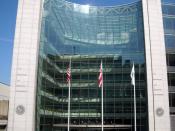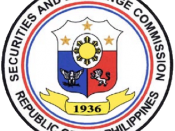This paper provides an in-depth evaluation of Sarbanes-Oxley Act, which promoted to produce change in the corporate environment, in general, by stressing issues of public accountability and disclosure in the financial operations of business. It explains how this is an Act that represents the government's and the Security and Exchange Commission's concern in promoting ethical standards in terms of financial disclosure in the corporate environment.
Corporate greed and corruption has altered the face of American business forever. Corporate greed was the primary reason in the downfall of Enron, Arthur Anderson, and WorldCom. The paper shows that the governing bodies, the Senate, NASD, the Securities and Exchange Commission, and other authorities decided to act and in 2002, the Senate introduced the Sarbanes-Oxley Act of 2002. This paper looks at the mission and purpose of the law and examines its affect on the accounting industry.
HISTORYOn July 30, 2002, President Bush signed into law the Sarbanes-Oxley Act of 2002, this paper will henceforth refer to it as the Act and SOX.
Another name for the Act is the Public Company Accounting Reform and Investor Protection Act. The shorter name comes from the two senators, Michael Oxley of Ohio and Paul Sarbanes of Maryland. They receive credit for engineering the Act. The new law came after major corporate scandals involving Enron, Arthur Anderson, and WorldCom. The law intends to bolster public confidence in the nation's capital markets and imposes new duties and significant penalties for non-compliance on public companies and their executives, directors, auditors, attorneys and securities analysts. The full implications of the legislation will come after further actions by the Securities and Exchange Commission and the newly created Public Company Accounting Oversight Board (PCAOB). Most of the provisions of this new law only apply to public companies that register with...


